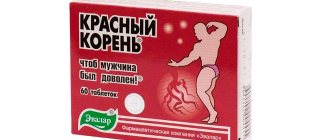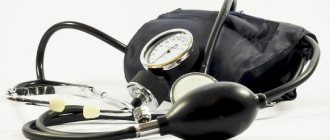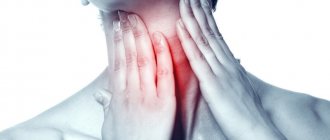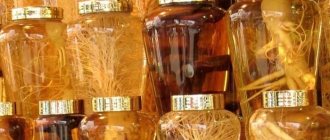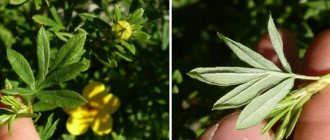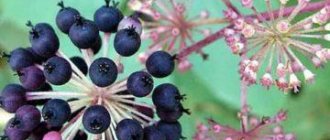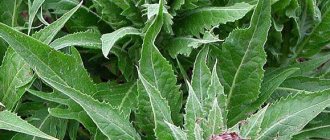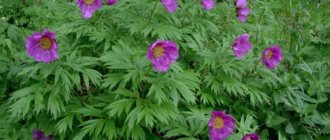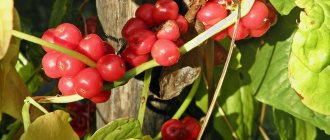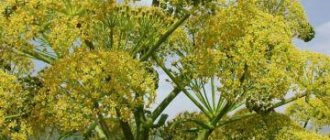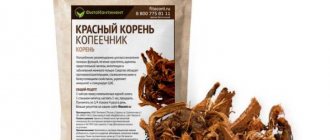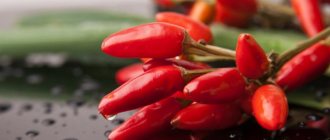Ginseng bushes
The name ginseng is translated from Chinese as “root man.” Its other names are divine herb, gift of immortality, root of life. Its healing properties were found and used even before our era in Asia, but the recipes were kept strictly secret and only in the 17th century in Europe the details of the preparation of medicinal preparations from ginseng root were revealed.
Where does ginseng grow?
The plant's homeland is East Asia. Ginseng also grows in North America, Eurasia, Vietnam, Tibet, China and Korea. In Russia, the ginseng herb grows in the Far East, Siberia and Altai. It can be found in dense forests, where there is little sun and a lot of moisture, in the mountains - on the eastern and northern slopes, it prefers fertilized and loose soils. There is not much wild ginseng; in natural conditions it grows very slowly and cannot satisfy the needs of everyone who wants to improve their health, so it is additionally grown on artificial plantations.
What does ginseng look like?
This is a perennial herbaceous plant, it grows up to half a meter, the root is large, reaching 15 cm, with small roots branching from it. The color of the root is gray-yellow and produces a pleasant aroma. Stems are solitary, erect. Ginseng leaves are wide, pale green in color, up to 30 cm long.
The ginseng flower consists of small inflorescences collected in an umbrella, colored white or pink. Flowering begins in early summer and continues until autumn; the fruits ripen at the end of September, forming a red drupe with seeds. Ginseng seeds are pale green in color. For medicinal purposes, only the root is used, the plant itself is not used.
Ginseng root
Which ginseng is the most healing - its types
There are a total of 13 known types of ginseng, the most common:
- Common or real ginseng is found in the Far East, less often in China and Korea, and has great medicinal properties.
- Chinese ginseng is a red book plant, as it is practically exterminated. The country of origin of this type of ginseng is China. It is used for medicinal purposes in medicine, cosmetology and for cooking.
- Siberian ginseng is the name given to Eleutherococcus and belongs to the Araliaceae family. Its chemical composition is close to ginseng, helps with chemical, toxic and radiation damage, and is used by astronauts.
- Wild ginseng is practically exterminated, since the raw materials are very expensive. It can be seen in North America, China and Russian Primorye.
- American or five-leaf - found in America, has a cooling property, quenches thirst well and relieves heat.
- Korean ginseng is the most common, has an adaptive effect and is effective in the treatment of female and male sexual diseases.
- Mountain ginseng - grows in the mountains at an altitude of 3200-4500 m above sea level. Helps with osteoporosis, infertility, increases the vitality of the body.
- Peruvian ginseng Maca - grows in the mountains of Bolivia, Peru and Argentina. Very rich in vitamins and iron. It improves sexual performance and stamina in men.
- Imperial ginseng Bing Han is an artificially grown ginseng; it includes all the beneficial and healing substances of wild ginseng. Based on it, the Bing Han company produces powders and tablets.
- White ginseng is a type of imperial ginseng grown by specialists from the Bing Han company, which has no contraindications or side effects.
- Korean red ginseng is the name given to rhizomes prepared using a special method, by steaming and drying. It is a derivative of black ginseng.
- Black ginseng is an invention of the food industry; the method of obtaining it boils down to increasing the content of ginsenoside in the root. To do this, steamed red ginseng is dried and steamed several times.
- Golden root - Tibetan ginseng or Rhodiola rosea. It has a stimulating effect on the nervous system and increases resistance to adverse external factors. It, like ginseng, is an adaptogen, but it acts more gently on the body and has no contraindications.
Ginseng roots
Medicinal properties of ginseng root
- Stimulating and tonic – has the effect of stimulating the central nervous system, relieving depression, weakness, physical and mental stress. Normalizes metabolism, increases blood pressure, reduces blood sugar, stimulates the immune system.
- Anti-inflammatory - help in the treatment of colds, flu, ARVI, bronchitis, diseases of the stomach and intestines, restores strength after illnesses.
- Antiseptic - used to treat hepatitis A, liver diseases, healing wounds and bruises.
- Adaptogenic - help a person adapt to difficult physical and stressful situations. Activate and restore the vital forces of the body.
What are the benefits of ginseng root?
Ginseng root has many medicinal properties that affect various processes in the body. So, why does everyone value this plant so much? It has the following beneficial properties:
- increases appetite;
- has a general strengthening and tonic effect;
- helps in recovery after serious operations and serious illnesses;
- can improve performance;
- normalizes low blood pressure;
- reduces blood sugar and cholesterol levels;
- helps with the functioning of the endocrine glands;
- has a positive effect on the central nervous system;
- increases sexual desire;
- restores sexual function in men.
Beneficial components of ginseng root
Ginseng roots are rich in micro- and macroelements beneficial to the human body. For example, they contain large amounts of potassium, calcium, magnesium and phosphorus. The root also contains copper, cobalt, iron, zinc, chromium and manganese.
In addition, ginseng roots are rich in B vitamins and vitamin C.
"Root of Life" also contains a high concentration of essential oils (especially farnesol), water-soluble polysaccharides (up to 40%) and alkali-soluble polysaccharides (up to 10%).
The main active ingredients contained in ginseng roots, of course, are saponins, xatriols, and BA polyacetylenes.
Ginseng: beneficial properties and contraindications
Ginseng root is medicinal and has been used for medicinal purposes since ancient times. Decoctions, tinctures, extracts with honey, teas and extracts of ginseng have medical use. Used in pharmacology, official and folk medicine, used in cosmetology and for cooking. You can purchase ginseng in the form of dry raw materials, powder, tincture, extract, tablets, capsules, drops, vitamins, or you can prepare ginseng at home.
Application for women: taking ginseng helps normalize blood pressure during menopause, improves mood, relieves irritation, normalizes metabolism, reduces weight, rejuvenates skin, strengthens nails. However, doctors do not recommend taking ginseng to women under 45 years of age, since the stimulating effect of ginseng increases immunity, and the young body itself should have an active lifestyle without taking stimulants.
Ginseng for men: the plant increases stamina by supplying a man with minerals, vitamins, amino acids, and valuable oils. Ginseng activates sexual activity and sperm motility, cures chronic prostatitis. Slows down the aging of men, prolonging their active sexual activity and testosterone production. Effective for men who play sports and have heavy physical and mental stress.
Ginseng for children: Drinking ginseng is not recommended for children under 12 years of age. Since the stimulating and tonic properties of the plant can cause severe overexcitation of the child’s unstable psyche, sleep disturbance, and febrile syndrome.
Ginseng for hair
Ginseng extract for hair: used to treat and strengthen hair. It is effective to use hair masks using ginseng oil and decoction. To do this, rub them thoroughly into the roots, cover the head and leave for half an hour. Wash off with warm water; such procedures are recommended to be done 2-3 times a week. Shampoos with ginseng extract have a positive effect; they can be purchased ready-made. To get a good result, they must be used constantly. To consolidate the result, it is useful to use balms with ginseng. Your hair will become healthy, thick and silky.
Harm of ginseng: with prolonged and excessive use of drugs, side effects may appear:
- Children may experience headache, nervousness, nausea, and vomiting.
- In men, there is a possible risk of developing the opposite effect - against the background of increased excitability, sexual activity will decrease.
- In women, if the instructions for use are not followed, hormonal imbalances and the menstrual cycle may occur.
It is important to remember that treatment with ginseng can be harmful and therefore, before starting to take medications, you should consult with your doctor.
Are there any risks and contraindications for taking ginseng?
Side effects from taking ginseng are usually mild. This plant may act as a stimulant in some people, causing nervousness and insomnia. Long-term use or high doses of ginseng can cause headaches, dizziness, stomach upset and other unpleasant symptoms. Some people may also be allergic to this plant.
Because ginseng may affect blood sugar levels, people taking medications for diabetes should always consult their healthcare professional before taking ginseng.
Ginseng may also interact with warfarin and some depression medications. Do not take ginseng without consulting your doctor if you are prescribed such medications. And keep in mind that caffeine may increase the stimulant effects of ginseng, which may prevent you from falling asleep.
To avoid side effects from taking ginseng, some experts suggest that you should not use this plant for more than three months (and sometimes for several weeks) at a time. So after completing the course, be sure to take a break.
- Author: Maria Minaeva
How to take ginseng
Ginseng is taken in the form of tinctures, decoctions, teas, oil and honey extracts. You can purchase ready-made preparations at the pharmacy, or you can prepare ginseng at home.
Honey with ginseng: up to 25 gr. dry root add 0.5 kg. honey, put in a warm and dark place for infusion for 2 weeks. Take a tablespoon daily. Boosts immunity, reduces nervous irritation, fatigue, and normalizes sleep.
Honey with ginseng
Ginseng oil: 30 gr. dry root pour 200 ml. heated vegetable or olive oil, infuse for two weeks in a dark place and drink a tablespoon twice a day. The oil has general strengthening and tonic properties, activates the immune system, treats colds, bronchitis, relieves inflammation, and improves the condition of diseases of the stomach and intestines. Used in cosmetology for skin and hair care.
Ginseng oolong tea: contains red ginseng extract and Chinese tea in combination with various herbs. It tastes good, invigorates well, increases performance, and strengthens the immune system.
Royal Jelly with Ginseng: This is a product of plant origin. Royal jelly in combination with ginseng is a tonic that increases performance and sexual function, and reduces cholesterol. Royal ginseng has a positive effect on the functioning of the nervous system and brain.
How to brew ginseng
Tea with ginseng: prepare as follows - brew ginseng powder in the amount of a teaspoon with a glass of boiling water, infuse, filter. Take a tablespoon before meals three times a day for a month. Then take a short break and repeat the course if necessary. Drinking tea has a beneficial and healing effect on the entire body. It tones, relieves nervous fatigue, and increases the body's resistance.
Ginseng tea
Ginseng decoction: to prepare the decoction use crushed ginseng - 20 g. The root is placed in half a liter of boiling water, boiled over low heat for 5 minutes, infused, and filtered. The decoction is less effective than ginseng root tincture and is indicated for use by people who do not drink alcohol - children over 12 years of age, drivers, athletes, alcohol addicts.
Green tea with ginseng: add 1 teaspoon of crushed roots and 2 tablespoons of green tea to half a liter of boiling water. Infuse and drink 1/2 cup twice a day (you can add honey and lemon).
Extract of ginseng with honey: add honey (in the amount of 300 g) to the crushed root (in the amount of 10 g), mix and infuse in a dark place for 2 weeks. Take a tablespoon every day. Facial masks using honey extracts are useful.
Recipes using dried ginseng root
Alcohol tincture
10-15 gr. dry ginseng root is crushed and filled with a 30% alcohol solution of 500 ml. Infuse ginseng in a dark place at room temperature for at least two weeks. The course consists of 90 days, every 30 days take a break of 10 days. Take 5-20 drops.
The tincture is medicinal, you CANNOT drink it all at once; there have been cases of death.
After the liquid is finished, you can pour the remaining ginseng again with a 40% alcohol solution of 250 ml and also infuse. Drink according to the same scheme, shake the tincture first so that the ginseng can also be used in food.
The course can be repeated only after a year.
Based on alcoholic ginseng tincture, you can make your own ginseng vodka (or cognac). To do this, add 1 teaspoon of tincture to a 0.5 liter bottle of vodka. This vodka can be drunk like regular vodka.
Beer with ginseng
Add 25 drops of tincture to a bottle of beer. Can be drunk like regular beer.
Chinese script
Chinese recipes are made using an alcohol tincture of ginseng root and sugar. The method of taking the “Chinese recipe” is that the mixture of tincture and sugar should be kept in the mouth, without swallowing, until completely dissolved. Thus, the drug is absorbed in the mouth, bypassing the stomach and entering the vascular bed.
Take 20 minutes before meals, without drinking water.
The “Chinese recipe” is taken according to the following scheme: on the first day, 1 drop is taken, and on subsequent days the amount is increased by one drop per day. When the number of drops reaches the person’s age, their number is reduced by one per day. Upon completion of the course of treatment, take a break for 1 month, after which treatment is continued according to the same regimen.
Ginseng honey
15 gr. Grind dry ginseng root into powder. Heat 500 g of honey in a water bath until liquid and mix thoroughly with ground ginseng, transfer to a glass jar. Dosage: 1 teaspoon 3 times a day 20 minutes before meals. Course of treatment: 90 days, every 30 days break for 10 days.
Honey with ginseng has a delicate aroma and is pleasant to take.
Ginseng paste
Used to treat skin diseases and in cosmetic procedures.
Pour 2 tablespoons of powdered dry ginseng with 2-3 tablespoons of water, let stand for a couple of hours, then heat in a water bath to 60 degrees. C and cool to body temperature.
Ginseng tincture: instructions for use
You can purchase a ready-made tincture, but if you wish, you can prepare it at home with your own hands. To do this, we purchase ginseng root - whole, chopped or powder, 100 g. the crushed root is placed in 0.5 liters of vodka. Infuse in a place protected from light for 30 days, filter and the tincture is ready for use. Vodka can be replaced with alcohol; the method for preparing a tincture with alcohol is the same, only the strength of the alcohol must be diluted to 40 degrees. Indications for use, method of use and doses of alcohol tincture and alcohol tincture are identical.
Ginseng tincture
There is a Chinese recipe for making tincture. To do this, 3 tablespoons of crushed raw materials are placed in half a liter of vodka (diluted alcohol), kept for a day and heated to 60 degrees. The infusion process takes place in a place protected from light for seven days, administered orally with meals.
Tincture of ginseng - Eleutherococcus has a milder effect on the body with similar therapeutic effects.
How to take ginseng tincture
For treatment, drink the tincture 25 drops three times a day, for prevention 15 drops 3 times a day. There is a homeopathic regimen: start taking 1 drop and increase the intake by 1 drop every day, reach 30 drops and start decreasing to 1 drop. Drink 30-40 minutes before meals. Take it for a long time (from 1 to 1.5 months), take a break of 10 days and continue a new course of treatment.
Ginseng tincture
Ginseng tincture: indications for use - this is an elixir for humans, ginseng root tincture has a more healing effect, its medicinal properties are superior to those of decoctions and teas:
- It has a calming and tonic effect on the body. It is used for physical and mental overwork, fatigue, weakness and apathy, has a calming effect on the nervous system;
- The general strengthening property of the tincture helps to activate the vital forces of the body and improve immunity;
- The adaptogenic property helps a person cope with heavy loads, stress, and increases the body’s endurance;
- Ginseng tincture increases blood pressure;
- Helps fight type 2 diabetes;
- Ginseng for immunity has a stimulating effect, increases performance, stimulates sexual function;
Useful properties of ginseng tincture
The healing properties of ginseng tincture help to increase a person’s vitality, improve emotional background, quality of sleep, accelerate wound healing, and exhibit many other beneficial effects.
For men
The benefits and harms of ginseng for men are primarily manifested in increased libido. Over time, the level of hormones in the body of the stronger sex inevitably decreases, general well-being worsens, and mood drops. The beneficial properties of ginseng tincture help treat sexual impotence, infertility, and stimulate sexual desire.
The benefits of ginseng tincture for men are manifested in improving blood circulation in the genitals, influencing the quality of erection and sperm quantity, and stimulating smooth muscles. The beneficial properties of ginseng tone, increase physical endurance, vital activity, which also affects potency. The tincture helps cope with stressful conditions and serves as a tonic.
In addition, the benefits and harms of ginseng are manifested in hypertension, heart failure, diabetes mellitus (strengthens the effect of drugs, reduces sugar), and prevents the development of cancerous tumors in the body. The tincture facilitates the occurrence of inflammatory processes in the respiratory tract, strengthens the lungs, and also improves digestion, stomach function, helps with poisoning, and exhibits other beneficial properties.
For women
The benefits of ginseng tincture for women appear after forty-five years. Before this age, various undesirable effects may occur. In any case, you should take the tincture after consulting a doctor, unless there are contraindications. Following these measures will help prevent harm and negative consequences and fully experience the beneficial power of ginseng.
For older women who experience pain during menstruation, doctors often recommend the tincture. And this is not done in vain, because the benefits and harms of ginseng have been studied quite well in practice. The tincture relieves pain from cramps in the abdominal area, relieves mood swings, and also increases immunity and endurance, strengthens muscles.
Actively affects hematopoietic function, stimulates the production of healthy blood cells, normalizes blood pressure, improves blood circulation, and has many beneficial and healing properties. During treatment with ginseng, gas exchange in the cerebral cortex increases, heart function and visual function improve, endocrine glands are stimulated, and oxidative processes accelerate.
The beneficial properties of the tincture help to cope with nervous disorders, anxiety, restore mental strength and fight the harm of nervous overload and stress. Ginseng improves mental activity, regulates the production of stress hormones and stimulates the formation of endorphins, and exhibits other beneficial properties: cleanses the body of toxins, removes excess fluid and eliminates swelling.
In sports and bodybuilding
Many athletes involved in bodybuilding and long-distance running use the beneficial properties of ginseng to enhance physical endurance. Some scientists confirm the fact that the components of the tincture help muscles use energy more efficiently.
Often, athletes develop hypotension due to heavy physical exertion, which is harmful and complicates a person’s life. The physical system thus tries to protect itself from energy loss. Preventive use of ginseng tincture will help avoid such problems, since the beneficial properties of the substances contained in it have a general strengthening effect on the whole person.
For weight loss
The beneficial properties of ginseng tincture also help against obesity: they speed up metabolism, cleanse deposits of toxins and waste, remove excess cholesterol and cleanse blood vessels, thereby normalizing blood flow throughout the body. They also participate in metabolic processes and accelerate the conversion of fats into energy. For this purpose, take 15-30 drops twice, for 1.5 months.
Attention! Ginseng tincture alone will not be enough. The product must be combined with diet, physical activity and other attributes of a healthy lifestyle.
How to drink ginseng tincture
The tincture contains general tonics that activate mental and physical activity. To avoid insomnia, you should avoid taking the tincture in the afternoon. After taking the tincture, there is a clearly defined pharmacological activity, which leads to an increase in blood pressure and therefore it is recommended to take it in the first half of the day. Should be stored in a closed place, protected from light and in a cool place. It is recommended to drink the open tincture within two weeks.
The tincture is used to treat:
- Neurological diseases;
- Anemia;
- Arthritis, arthrosis, joint diseases;
- Headache;
- Atherosclerosis, hypotension;
- Impotence;
- Eye diseases;
- Colds, ARVI, flu, bronchitis;
- Heart disease;
- Diseases of the stomach and intestines;
- After illnesses to restore strength;
Courses of treatment should be carried out with breaks, the body should be given rest, since treatment with ginseng is long-term.
Ginseng in women's health care
Use for women: the tincture is an antidepressant and is indicated for women during menopause. Helps reduce apathy, depression, irritability, improves vitality, improves mood, normalizes sleep, and has a beneficial effect on appearance. Ginseng is useful for the skin; the tincture can renew and rejuvenate it.
Application for men: ginseng tincture for potency plays a big role - it relieves stress, nervous excitability, nervous and physical exhaustion, thereby acting on the root of the problem. By restoring nervous balance, the tincture stimulates sexual activity and increases potency, eliminating the cause. Ginseng root stimulates blood supply to the genital organs and activates sperm movement. These properties of ginseng cure chronic prostatitis and have a beneficial effect on the process of conception.
Ginseng tincture - benefits and harms: in case of overdose and individual intolerance to the components of the drug, side effects may occur - in the form of headaches, dizziness, nausea, vomiting, increased blood pressure. Increased nervous excitability, nosebleeds, insomnia, and allergic rashes may occur. It should not be taken simultaneously with other medications - tranquilizers, antidiabetic drugs, ginseng enhances the effect of warfarin, increases blood pressure, and the use of strong coffee, tea and alcohol should also be avoided during treatment. It is not recommended to use preparations with ginseng in hot weather (it warms the body).
Contraindications
Ginseng, like any other medicinal plant, is not completely harmless. Before drinking tea, tinctures or preparations containing the root of the plant, you should consult a doctor or at least carefully read the instructions. Ginseng root should not be taken if:
- chronically high blood pressure, insomnia;
- mental illness and excessive nervous excitability;
- epilepsy and thyroid disorders;
- acute infectious and inflammatory processes;
- with poor blood clotting and bleeding;
- dermatitis, eczema, inflammatory skin diseases;
- pregnancy and lactation;
- individual allergic reaction.
In addition, it should not be given to children under 16 years of age. Ginseng-based products have a powerful tonic and stimulating effect that can aggravate any disease; they can only be taken with the approval of a doctor. Possible side effects include nausea, vomiting, sleep disturbances, and dizziness. If such symptoms occur, you should immediately stop taking ginseng.
We recommend reading: How to brew ginseng oolong.
photo: depositphotos.com/Icc54613, leungchopan, Icc54613
Medicines containing ginseng
Ginseng syrup – contains root extract. It gives strength, improves health and rejuvenates the body. Price per bottle (250 ml) is about 1250 rubles.
Ginseng capsules are an extract of Chinese ginseng and Eleutherococcus roots. For treatment, take 2 capsules three times a day, for prevention - 1 capsule per day.
Ginseng capsules
Ginseng + Eleutherococcus – plant adaptogen. Activates the body's metabolic processes, strengthens and stimulates a person's mental and physical abilities. Available in tablets of 30 pieces, the average price is about 100 rubles.
Ginseng tincture is an alcoholic extract of the root in finished form. It is taken 25 drops 2 times a day. The course of treatment is 30-40 days. Price per bottle from 30 to 56 rubles.
Ginseng in granules is a dietary supplement, it is used both for the treatment of diseases and for their prevention.
Red ginseng extract is used for the complex treatment of type 2 diabetes mellitus and its prevention. It lowers blood sugar and cholesterol levels.
Green tea with ginseng “Black Dragon” - the drink adds strength, invigorates and strengthens. Relieves weakness and fatigue. The cost of a pack (100 grams) is about 270 rubles.
Herbion Ginseng is a herbal preparation that has a tonic effect. Normalizes blood pressure, reduces headaches, activates the body's defenses. Price per package from 150 to 360 rubles.
Doppelhertz Ginseng - stimulates and tones the nervous system, restores strength after illnesses. Available in liquid form (price for 250 ml - 280 rubles) and in capsules (price for 60 pieces - 310 rubles).
Ginseng and Schisandra - used as an active biological additive, a source of schisandrin and ginsenoside. Price per bottle 25 ml. – 130 rubles.
Elixir “milk with ginseng” – has a general strengthening and stimulating effect. Increases physical endurance and performance. Release form - ampoules, price for 10 pieces - from 400 to 650 rubles.
Night cream with ginseng and royal jelly - gently cares for sensitive skin, makes it elastic, silky, smooths out wrinkles.
What are the benefits of ginseng for men and women?
Boosting immunity
In 2021, Trends in Food Science & Technology reported a study that found ginseng to be a leading nutritional functional food with potential for immune support. Functional food is a term that refers to the healing benefits of ginseng.
The researchers also suggested that ginseng is an "immune therapeutic agent," with ginsenosides and polysaccharides being the most active, health-promoting herbal constituents known. There is also scientific evidence that one specific type of American ginseng extract can reduce the number and severity of colds in adults.
Reduced blood sugar levels
Several human studies have also found that ginseng can lower blood sugar levels. However, the correlation between blood sugar levels and ginseng use is still being studied due to the varying levels of phytochemicals in ginseng doses.
Improved cognitive abilities
Additionally, there is evidence that ginseng may (temporarily and slightly) improve concentration. For example, a 2008 study found that when patients with Alzheimer's disease took ginseng root daily for 12 weeks, their cognitive function improved.
Four years later, a 2012 study found that ginseng was effective in improving brain function in patients with severe Alzheimer's disease. But while studies like this are intriguing, many experts believe we need more evidence of the plant's effectiveness in improving human cognitive function. And for this it is necessary to conduct additional research.
Ginseng is considered a good remedy for:
- improve mood;
- increase endurance.
This plant is also used in the treatment of diseases such as:
- cancer;
- heart diseases;
- erectile disfunction;
- hepatitis C;
- high blood pressure.
However, serious and authoritative studies have not yet been conducted to confirm (or refute) these positive effects of ginseng on the body.
